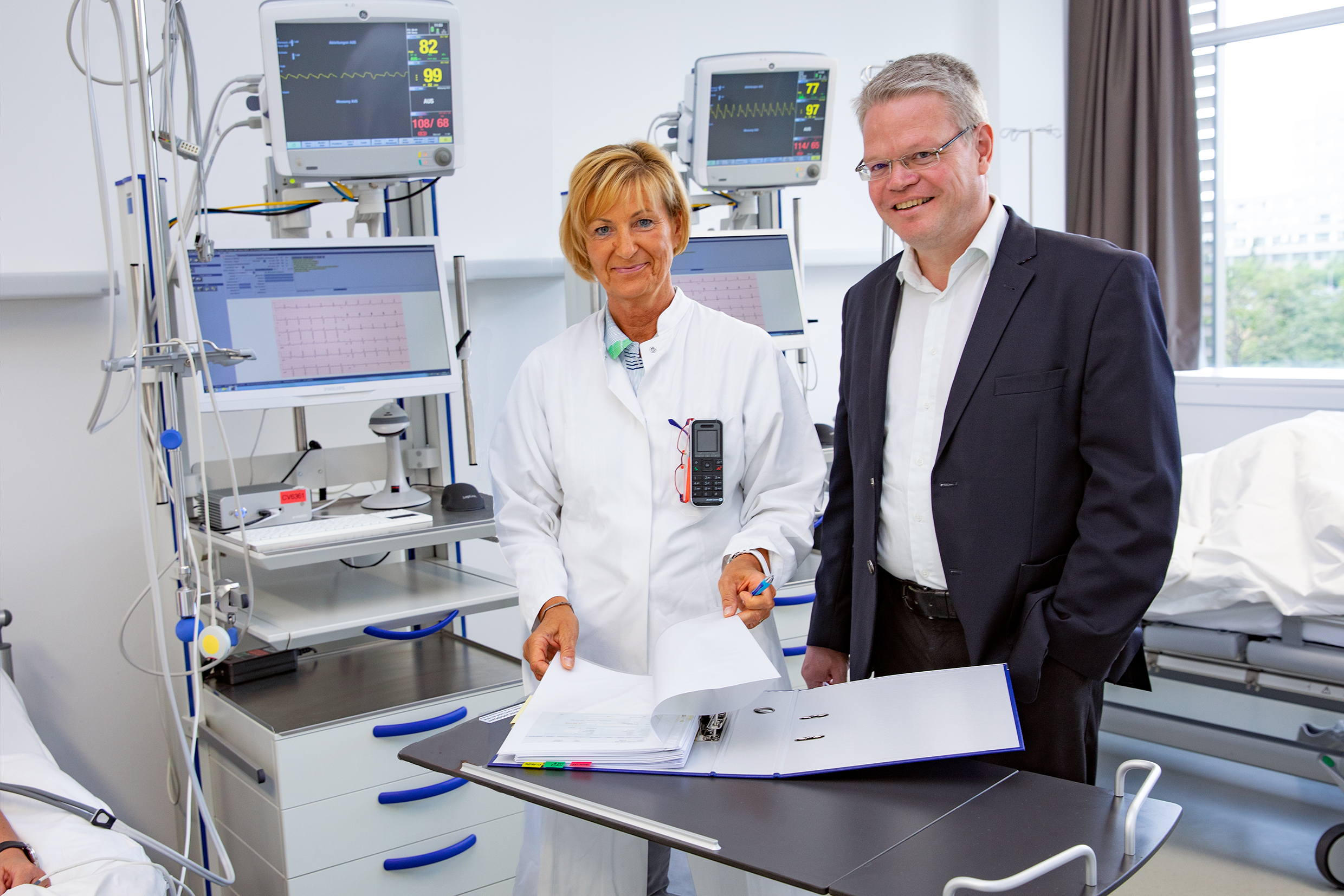Centre for Clinical Studies (ZKS) brings findings from science into practical application

Providing all-round care in clinical trials: ZKS head Professor Dr. Christoph Schindler and senior study nurse Carola Westenberg. Copyright: "Karin Kaiser / MHH".
09.12.2022
Hannover Medical School (MHH) is one of Germany's leading institutions in vaccine research. Before new vaccines are launched on the market, they have to undergo extensive clinical testing. The requirements for a clinical trial are high, the bureaucratic effort for planning and implementation is immense. Because this can hardly be done alongside the actual research work, the MHH has set up the Centre for Clinical Studies (ZKS). Here, the necessary infrastructure and highly qualified study staff are available to implement scientific findings clinically. The most recent example is two studies in vaccine research: one investigated whether an immune booster protects against severe courses of viral respiratory diseases. The other looked at the molecular mechanisms for the differential response of older people to influenza vaccination. The work has been published in the high-impact journals Clinical Infectious Diseases and Nature Communications.
VPM1002 boosts immune response
The study on the immune response after flu vaccination was conducted in cooperation with the Helmholtz Centre for Infection Research (HZI). The ZKS primarily contributed the clinical-surgical implementation of the study protocol. "We offer an all-round service for all phases of clinical research that is unique in the German research landscape," emphasises Professor Dr. Schindler, head of the ZKS. This also includes so-called proof-of-concept studies at the beginning of clinical development, when the support effort is particularly high in order to translate basic science into clinical trial procedures. In addition to study consulting and project development, this also includes precise budget planning as well as data and quality management.
"The study on the immune booster was run entirely at our Clinical Research Centre," says Professor Schindler. The focus of the "VPM Elderly Vaccination Study" is the vaccine VPM1002, which is based on a tuberculosis vaccine developed at the beginning of the 20th century. This vaccine has been genetically modified to produce a better immune response with fewer side effects. "VPM1002 is a vaccine that does not specifically protect against a specific virus, but rather strengthens the immune defence against viral pathogens of upper respiratory tract infections in general," explains the clinical pharmacologist. These non-specific, immunity-boosting effects on the immune system are also called "trained immunity".
A weapon in future pandemics
"We conducted the study with more than 2,000 participants aged 60 and older during the Corona pandemic at a total of twelve test centers nationwide and investigated the effect of VPM1002 vaccination on the clinical course of upper respiratory tract infections," says Professor Schindler. The result: the vaccination was not only able to shorten the overall duration of the illness, but the severity of the illness was also significantly lower. "Even participants without SARS-CoV-2 vaccination were sick for fewer days thanks to the VPM1002 booster, did not have to be hospitalised for as long and had fewer fever days," emphasises the study leader.
In principle, VPM1002 is effective against a broad spectrum of respiratory diseases. In the event of possible future waves of infections with newly emerging respiratory pathogens, it could therefore be used as a bridge vaccine until specific vaccines become available. "This would give us a defensive weapon in the event of new pandemics, which would help us buy time for the moment."
SERVICE:
For more information, contact Professor Dr Christoph Schindler, schindler.christoph@mh-hannover.de, phone (0511) 5350-8350.
The original paper investigating the immune response after influenza vaccination "Distinct immunological and molecular signatures underpinning influenza vaccine responsiveness in the elderly" can be found here, a summary of the results of the clinical trial on the VPM1002 booster effect "VPM1002 as Prophylaxis Against Severe Respiratory Tract Infections Including COVID-19 in the Elderly: a phase III randomised, double-blind, placebo-controlled, multicenter clinical study" can be found here.